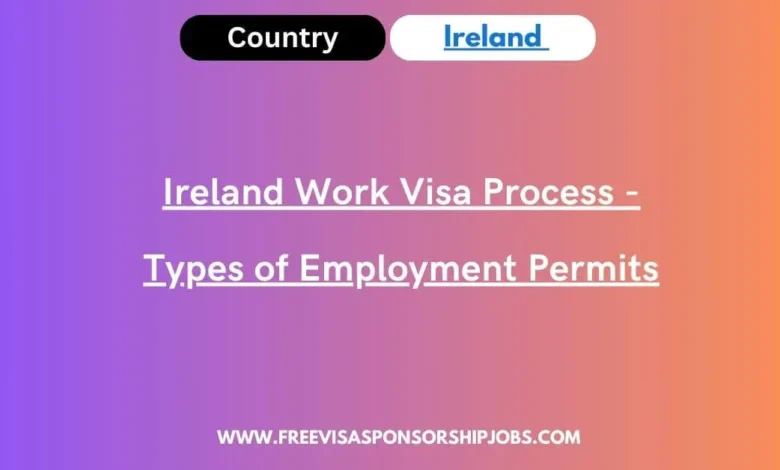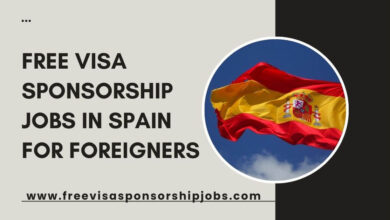Ireland Work Visa Process – Types of Employment Permits

Ireland is a European country that often lets people from other countries work there. This post talks about how to get an Ireland work visa and the different kinds of work permits. Ireland gave out 39,955 work passes in 2022. In 2023, 30,981 work permits were given to people from other countries. Up to 6,874 work passes have been given out so far as of March 15, 2024. This includes all areas of work. You can look at the numbers about work permits in Ireland from this page.
People from India, Pakistan, Egypt, the Philippines, Brazil, China, Nigeria, Malaysia, and many other places get most of the work visas. People from all over the world are welcome in Ireland. And if you are not from Europe, you will need to get an Ireland work pass first. There are also nationals who need to apply for a visa. The Ireland Long Stay type D Visa is what you need if you want to work in Ireland for more than 90 days. You can find out more about how to apply for an Irish visa below.
Details of Ireland Work Visa Process
Types of Ireland Work Visas and Permits
There are nine different types of work permits available in Ireland. Here’s a short summary of each permit, along with a link to the type of work permit that you need for more information.
1) Critical Skills Employment Permit
This is the most common and well-known type of work pass in Ireland. The Critical Skills Employment Permit is for applicants who are very educated and want to live in Ireland permanently.
Check out the list of jobs that can get you a Critical Skills Employment Permit. The job market does not need a needs test.
2) Ireland General Employment Permit
With the General Employment Permit, you can work in any job, even seasonal ones, in agriculture, building, or other fields. People from a third country can get this General Employment pass to work in jobs where there aren’t enough workers or people with the right skills.
- All jobs are eligible unless they are on the list of jobs that are not qualified for employment permits.
- Find out more about the General Employment Permit.
3) Dependant/Partner/Spouse Employment Permits
People who depend on the person who has a Critical Skills Employment Permit can get these types of permits.
- To learn more about the Dependant/Partner/Spouse Employment Permit, click here.
4) Intra-Company Transfer Employment Permit
This pass is given to people who want to move to the Irish branch of a company where they already work.
- Learn more about Intra-Company Transfer Employment Permit
5) Internship Employment Permit
This permit is for non-EU citizens who are full-time students at a college or university outside of Ireland learning a subject related to jobs on the Critical Skills Occupations List and want to come to Ireland to gain experience.
- Learn more about the Internship Employment Permit
6) Contract for Service Employment Permit
Issued for self-employed individuals or those on short-term, specific service contracts.
7) Sport and Cultural Employment Permit
helps elite athletes, sports coaches, and people working in the entertainment and cultural industries find jobs.
8) Exchange Agreement Employment Permit
Issued for participants in approved exchange programs for work placements.
9) Reactivation Employment Permit
For people from outside the EEA who used to have a legal work permit and want to return to working in Ireland.
Requirements to Get an Ireland Work Permit
- Find an Employer: Get a job offer in Ireland (list of job sites below).
Employer applies for Employment Permit: The Department of Enterprise, Trade, and Employment (DETE) gives out work permits. Your boss will apply for one on your account.
Employment Permit Granted: If you pass, you’ll be given a job permit.
How to Apply for the Ireland Work Visa?
There is no such thing as an Ireland work pass or an Ireland work visa.
- If the Irish government gives you a work visa, you can go to Ireland and work there.
- You can do a certain job in Ireland if you have a work pass from the Irish Department of Enterprise, Trade, and Employment (DETE).
- As soon as you have your work pass from the Department of Enterprise, Trade, and Employment (DETE), you can apply for an employment visa.
- You will need to apply for a Short Stay (C) Visa if your job only lasts up to 90 days. The long stay (D) visa is what you need if it’s longer than 90 days.
- Send your work permit along with your visa application to the Irish Immigration Service. You can find out how to apply for an Ireland visa on this page.
Processing Time
Most of the time, it takes up to eight weeks from the time you send your application to the visa office. It is suggested that you wait to buy plane tickets until you know the result of your visa application.
Find Employment, and Visa Sponsorship Jobs in Ireland
- https://Jobs.ie
- This site lists more than 30,000 Jobs in Ireland. Search for a Job there.
- IrishJobs.ie
- RecruitIreland.com
- EURES Ireland
Skill Shortage List
The Critical Skills Occupations List (CSOL) identifies occupations in Ireland that are deemed:
- Critically important for growing the Irish economy.
- Highly demanded by employers due to skill shortages.
Conclusion:
To get a work visa for Ireland, you need to know about the different types of work permits, meet certain standards, apply through the Department of Enterprise, Trade, and Employment (DETE), and send a visa application to the Irish Immigration Service. Use reputable job search engines to find work and chances to get a visa in Ireland.
People Also Ask
-
What are the requirements to get an Ireland work permit?
You must find a job in Ireland, have the company apply for an Employment Permit from DETE, and meet the requirements for the type of work permit you want. The process needs to be backed by a company and approved by the right authorities.
-
What is the processing time for an Ireland work visa?
The processing time for an Ireland work visa is typically up to eight weeks from the time of application submission to the visa office. It is advisable to wait for visa approval before making travel arrangements.




